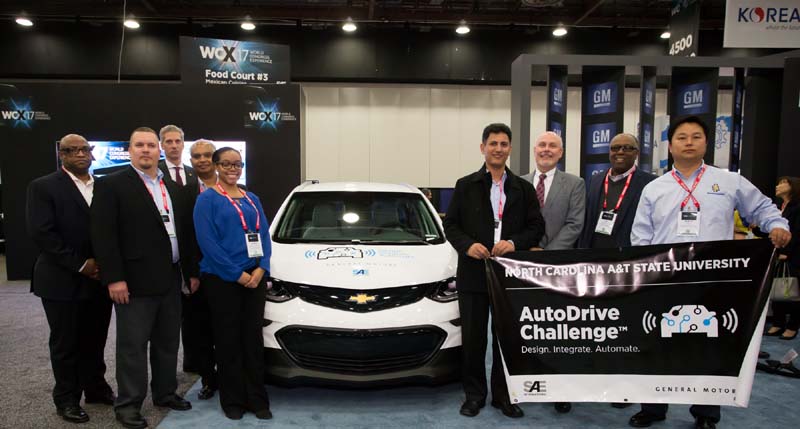
GM Selects N.C. A&T for New Autonomous Vehicle Competition
Greensboro, N.C. (April 10, 2017) -- The Society of Automotive Engineers (SAE) World Congress Experience, General Motors Co. (GM) and SAE International announced North Carolina Agricultural and Technical State University one of eight North American universities that will compete in the upcoming AutoDrive Challenge.
The new autonomous vehicle design competition is a three-year challenge to develop and demonstrate a fully autonomous passenger vehicle. The competition’s technical goal is navigating an urban driving course in an automated driving mode as described by SAE Standard (J3016) Level 4 definition by year three of the challenge.
“The College of Engineering is very proud that our team has been
selected for this competition. I am very confident in the capabilities
of the faculty team committed to the project, as their expertise in
vehicle design and autonomy is why we chose to target this AutoChallenge,”
said Robin Coger, dean of the College of Engineering. “Representatives
from our faculty team are eager to move forward with the preparations
necessary to ensure the team’s success.”
Throughout the competition, students will focus on autonomous
technologies and allow for modification and testing. They will work with
real-world applications of sensing technologies, computing platforms,
software design implementation and advanced computation methods such as
computer vision, pattern recognition, machine learning, artificial
intelligence, sensor fusion and autonomous vehicle controls.
GM will provide each team with a Chevrolet Bolt EV as the vehicle platform. Strategic partners and suppliers will aid the students in their technology development by providing vehicle parts and software. Throughout the AutoDrive Challenge™ competition cycle, students and faculty will be invited to attend technology-specific workshops to help them in their concept refinement and overall autonomous technical understanding.
“GM is very excited to work closely with these eight universities over the next three years,” said Ken Kelzer, GM vice president of Global Vehicle Components and Subsystems. “The students and faculty at these schools bring deep knowledge and technical skills to the competition. We are proud to help offer these students the hands-on experience necessary for them to make an immediate impact on the automotive world when they graduate.”
The challenge will operate on the following schedule:
Beginning in fall 2017, year one will focus on concept selection for university teams by having them become familiar with sensing and computation software. They will be tasked with completion of a concept design written paper as well as simple missions for on-site evaluation. These simple missions can include straight roadway driving and object avoidance/detection. The year one final competition will be hosted at GM’s Desert Proving Ground in Yuma, Arizona.
In year two, teams will refine their concept selections into solid system developments and will have more challenging dynamic events for testing on-site, including dynamic object detection and multiple lane changing.
Year three will culminate with final validation of design and concept refinement. Teams will navigate complex objectives of on-site testing, including higher speeds, turnabouts and moving object detection.
GM and its partners produce vehicles in 30 countries, and the company has leadership positions in the world's largest and fastest-growing automotive markets.
SAE International is a global association committed to being the ultimate knowledge source for the engineering profession. By uniting over 127,000 engineers and technical experts, the association drives knowledge and expertise across a broad spectrum of industries.
Other universities selected for the challenge include: Kettering University, Michigan State University, Michigan Tech, Texas A&M University, University of Toronto, University of Waterloo and Virginia Tech.